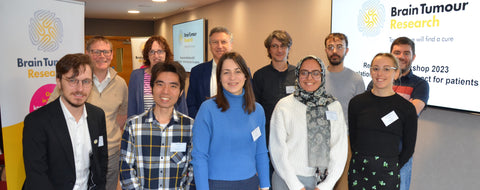Post-doctoral researcher, Dr Dani Chattenton, a paediatric brain tumour specialist at our Centre of Excellence at Imperial College London, is working to improve the outcomes of children and young people with diffuse intrinsic pontine glioma (DIPG), a devastating brain tumour with an extremely poor prognosis.
Dani is in a unique position having worked at two of our four Centres of Excellence, starting out at The Institute of Cancer Research under the leadership of Professor Chris Jones, and now at Imperial College London with Dr Nelofer Syed.
Nicola Gale, our Research Communications Officer, caught up with Dani to talk about why she thinks that collaboration and skill sharing between our network of Centres of Excellence is key to not only the career development of brain tumour research specialists, but also in driving forward research in order to find a cure for all types of brain tumours.

What research are you leading at Imperial College London?
As a post-doctoral researcher at Imperial College London within Dr Nelofer Syed’s group, I'm leading research into metabolic therapies for DIPG. Inspired by their success in treating glioblastoma (GBM), we're exploring the potential effectiveness of arginine deprivation for DIPG, with the aim of developing new treatment options for this challenging disease.
Arginine is an amino acid that is critical for the growth and survival of human cancers. Results from pre-clinical models in Dr Syed’s lab suggest that by reducing the supply of arginine, GBM tumours are much more susceptible to radiotherapy. Building on this research, the team has been awarded additional funds to develop a clinical trial protocol where GBM patients will be treated with arginine deprivation and radiotherapy before tumour removal.

The Imperial College London research team, Dani Chattenton on the right at the front.
How will your research go on to help improve outcomes for children with DIPG?
Our research aims to improve outcomes for children with DIPG by overcoming challenges like the blood-brain barrier. The metabolic therapies we're investigating bypass the blood-brain barrier and may also activate the immune system, offering a multifaceted approach to combatting DIPG and the potential for synergistic combinations with immunotherapies.
While still in the early stages of researching metabolic therapies for DIPG, our progress has been accelerated by insights from previous research, expertise in mouse models, and dedicated funding support. Although it's premature to predict a definitive timeline, we're optimistic about the potential for our research to make a meaningful impact on patient outcomes in the future.
What research did you undertake at The Institute of Cancer Research?
During my PhD, I split my time between Imperial College London (ICL) and the Institute of Cancer Research (ICR), working on a project to enhance drug delivery for DIPG, a type of paediatric brain cancer. At Imperial, I adapted an ultrasound system originally designed to treat Alzheimer's Disease to target the pons, where DIPG originates. Then, I collaborated with the Ultrasound team at the ICR to develop and test a similar system on DIPG mouse models with support from the Glioma and MRI teams.
What was it like to move from one Brain Tumour Research Centre of Excellence to another?
Transitioning between Brain Tumour Research Centres of Excellence has been a fantastic experience, fostering a strong sense of community and collaboration. Reconnecting with colleagues and sharing insights has been invaluable, providing opportunities to advance brain tumour research collectively and contribute to our shared mission of combating these devastating diseases.
What role does collaboration play in your research, and scientific research as a whole?
Collaboration is absolutely crucial in our research. It's not just about sharing resources; it's about bringing together diverse perspectives and expertise to tackle complex problems.
Collaborating also fosters strong relationships and a supportive community. We rely on each other for advice, encouragement, and assistance when needed, which makes the research process more enjoyable and rewarding. Most importantly, collaboration amplifies the impact of our work. By combining our efforts, we can address larger-scale projects and make faster progress towards our goals.
By working with colleagues across disciplines and institutions, we can leverage a wider range of skills and knowledge, which often leads to more innovative solutions.

I understand that you are a very accomplished, UK ranked, middle-distance runner, what advice would you give to our supporters who are in the final stretch of their marathon training programme for London marathon 2024?
- Navigating the final stretch of marathon training can be challenging, but it's essential to stay focused and motivated.
- Remind yourself of your initial goals and the reasons behind your dedication to training.
- Listen to your body and prioritise rest and recovery to avoid burnout and injury.
- Inject variety into your routine to combat monotony and mental fatigue by exploring new routes or incorporating cross-training activities.
- Celebrate each small victory along the way, whether it's a new distance milestone or a personal best time.
- Fine-tune your fuelling and hydration strategies during long runs to ensure readiness for race day, sticking to familiar options to avoid surprises.
Trust in your training, believe in yourself, and embrace the upcoming challenge with positivity and confidence, remembering to enjoy the journey you've worked so hard to undertake.
Related reading:

